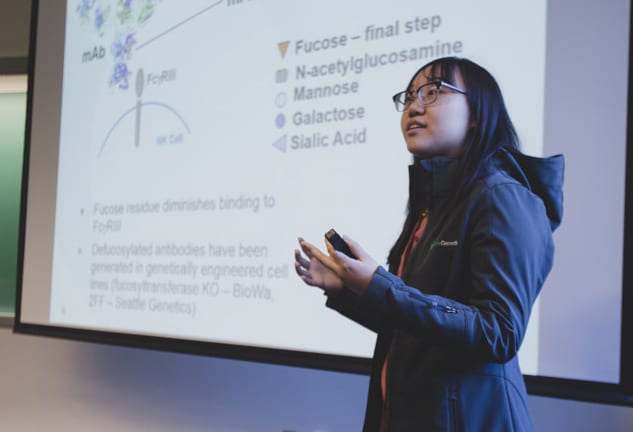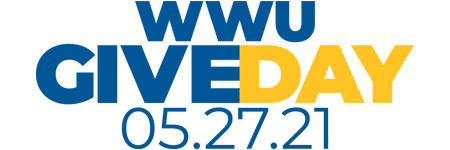Gifts supporting graduate research expand educational and professional opportunities for students in all disciplines and are critical for our future. Graduate students drive original research and discovery, deepen our understanding, and inspire, teach, and mentor our undergraduates.
Western needs your help to ensure these bright scholars have the funding they need to thrive, grow as scholars, and complete their research.
For over a year now, graduate students have continued their work, often from home, while struggling as we all have with the isolation, financial, and other hardships created by the pandemic. Your gift affirms the importance of their work and shows what is possible when we invest in a world that values learning and creativity.
The first $1000 in gifts to the Graduate School on Give Day will be generously matched dollar for dollar by David and Bahareh Patrick.
Two Ways to Give
The Graduate Studies Fund
Gifts to the Graduate School Fund directly support graduate student research, field experiences, and professional development opportunities like Western Washington University graduate student Hannah Hein’s research using drones. Hein focuses on a vital underwater grassland, the critically important eelgrass meadows of the Pacific Northwest, such as those found in Skagit County’s Padilla Bay. Healthy eelgrass beds are vital nursery habitat for ecologically and commercially important fish and shellfish species such as herring, salmon, and Dungeness crab. The beds also perform important roles in helping to filter the water column and stabilize nearshore sediment. Padilla Bay, one of 29 waterways in the country’s National Estuarine Research Reserve system, is the largest contiguous eelgrass meadow in the country south of Alaska and the second largest on the entire West Coast.
 Hannah Hein, MS candidate in Environmental Sciences
Hannah Hein, MS candidate in Environmental Sciences
Ross Travel Grant

The Dean Ross Endowment established by Dr. J. Alan & Dorothy C. Ross supports graduate student travel enabling scholars to present their work at professional venues, develop professional connections, and share, discuss and debate new ideas in their scholarly communities.
The Dean Ross Endowment allows Western graduate students to present papers at professional meetings and conferences, exhibit works of art at national and international showings, and to perform, direct or produce within professional performing arts venues. Such experiences are vital opportunities that often mark important milestones in their professional development.
Graduate Student Stories
 Liz Cameron, MS candidate in Biology
Liz Cameron, MS candidate in BiologyLiz Cameron is a WWU graduate student in biology who studies cellular stability during development. Due to the generosity of donors like you, Cameron was recently awarded both the WWU Graduate Research Award for her thesis project and the WWU Washington Space Grant Summer Research Award, a ten-week internship funded by NASA through the Washington Space Grant Consortium.
As an intern, Cameron will examine how the molecular mechanisms of cells may be altered by the environmental conditions of space by pushing forward with her thesis project, “Interrogating dynamic changes in centrosome protein conformation with FRET-FLIM," as it relates to NASA's Human Exploration and Operations Mission Directorate (HEOMD). FRET-FLIM stands for “Forester Resonance Energy Transfer - Fluorescence Lifetime Imaging Microscopy” and is a highly specialized kind of microscopy Cameron has been trained in at WWU.
But Cameron’s work doesn’t stop in the lab! This summer, she’ll be working together with the other WWU Washington Space Grant awardees to facilitate a STEM outreach event for school-aged children in Bellingham. Cameron will present her research from the summer during Scholars Week in spring 2022.

Kaitlin Rink, Doctor of Audiology candidate
Kaitlin Rink is a second-year Doctor of Audiology candidate, and due to the generosity of donors like you, she was recently awarded the WWU Graduate Research Award for her capstone project, “Evaluating performance of the Portable Automated Rapid Testing (PART) application in a non-clinical setting.” Rink’s research is especially timely with pandemic restrictions on in-person services. In-clinic testing has traditionally been very expensive and relies on bulky equipment. Rink’s research will extend the portability of diagnostic audiological testing to increase both accessibility of services for the hearing impaired and patient satisfaction with the process.
Rink is especially grateful for the collaborative research culture at Western and the supportive faculty who have empowered her to take ownership over her research. She emphasizes that starting with hands-on work in Western’s Speech-Language-Hearing clinic on day one is one of the great strengths of the program, and she is drawn to a future in early identification, diagnostics, and preventative medicine.

Stephen Haines, MFA candidate in Creative Writing
Stephen Haines is an MFA student in creative writing at Western Washington University and the managing editor of Bellingham Review. His work has been shortlisted at Epoch Press and has appeared or is forthcoming in Adelaide, Rathalla Review, Creative Colloquy, Bright Flash Literary Magazine, and the Scholar’s Week showcase at WWU. His thesis is a multigenre collection of fiction and creative nonfiction experimenting with form and mnemonic association.
Bellingham Review announced publication of Issue 82 in April, their first ever spring online release and eleventh online issue. Issue 82's feature on asemic writing highlights the talents of artists working in an imaginative, stunning field of expression that you truly must see to experience. This issue likewise includes 2020 contest winners as well as a robust collection of poetry, fiction, creative nonfiction, and hybrid work. Bellingham Review is the literary journal produced by WWU’s multigenre MFA program.
When you support the Graduate School,
your gift matters now and continues to
give for generations to come.

